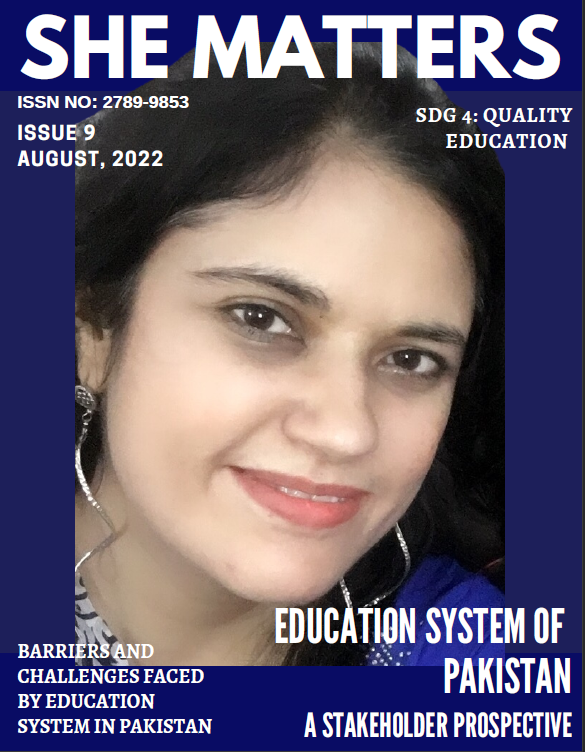Issue 9 Women Healthcare Academicians in Pakistan: Challenges and Opportunities
Message from Editor in Chief
Girls and women can face discrimination in all areas and throughout all stages of their life. Eliminating
discrimination in education is an important start, but women and girls will often continue to face discrimination upon leaving school. Discrimination, in all its forms, whether it happens in public or private, needs to be tackled in a comprehensive and holistic manner (cross-sectorally and through various measures that take into account how discrimination and inequality aggregate throughout a woman’s life) and at all levels in order to ensure that women and girls enjoy and benefit from their education. Common challenges include: the gender pay gap–women, on average 59 % women earn less than men; only 23% of parliamentarians and 5.7% of world leaders are women; lack of flexible working arrangements, parental leave, and maternity benefits; lack of access to healthcare and enjoyment of sexual and reproductive health and rights; exposure to gender-based violence against women, including harmful practices and paid and unpaid care work which continues to be disproportionately borne by women and girls i.e. a woman will do an average of four years extra work compared to her male peers over her lifetime.
Pakistan is the sixth most populated country in the world, but with more than 40 % of women never receiving an education, the nation has one of the lowest literacy rates in the continent. Pakistan ranks 153 out of 156 in the Global Gender Gap Report and according to UN Women, 53.6% of women are deprived of education, training, and employment in Pakistan, compared to only 7.4% of men. According to the SDG status report of 2021, the progress on SDG 4 has remained stagnant overall with the national literacy rate remained at 60% from 2015 to 2020. There is a need to draw up an effective strategy to ensure quality education for all across Pakistan. The education sector in Pakistan face multiple problems ranging from gender gap in the ratio of school enrolment for both boys and girls to the availability and utilization of funds for running various schools, colleges and universities. This issue highlights the challenges and opportunities for women healthcare academicians in Pakistan. The issue includes interview of Dr. Anab Fatima, renowned female academician and advocate showcasing challenges faced by women academicians in Pakistan. Facts regarding education system, challenges and way forward has been included in the issue. Articles on progress of Pakistan for achieving SDG 4: Quality education and perspective of stakeholders regarding education in Pakistan are also part of this issue. Moreover, real stories highlighting the factors responsible for poor quality education in Pakistan have also been included. I would like to acknowledge that launching this issue would not have been possible without the great and much appreciated contributions from the editorial and technical team. The robust intellectual support and well-timed contribution of content writers deserve special appreciatory applause. Our team expects similar sort of sincere dedication from the writers in near future. Enjoy reading the issue!
Contents of Issue
Guest of the Issue
Facts about Education System of Pakistan
Overview of Education System of Pakistan
Barriers and Challenges faced by Education System of Pakistan
SDG 4: Quality Education
Education System of Pakistan: A Stakeholder Prospective
Stories of Education System of Pakistan
